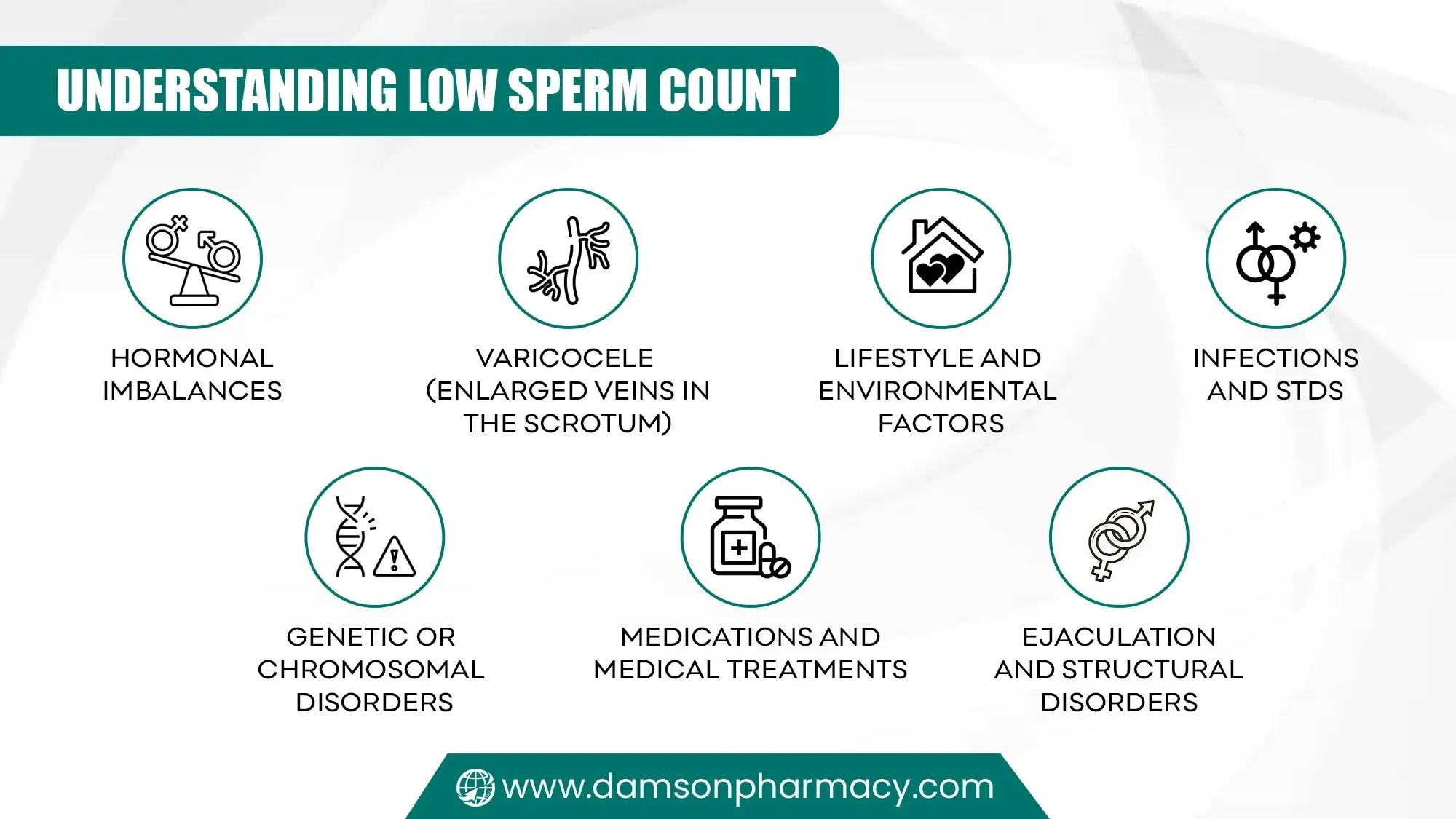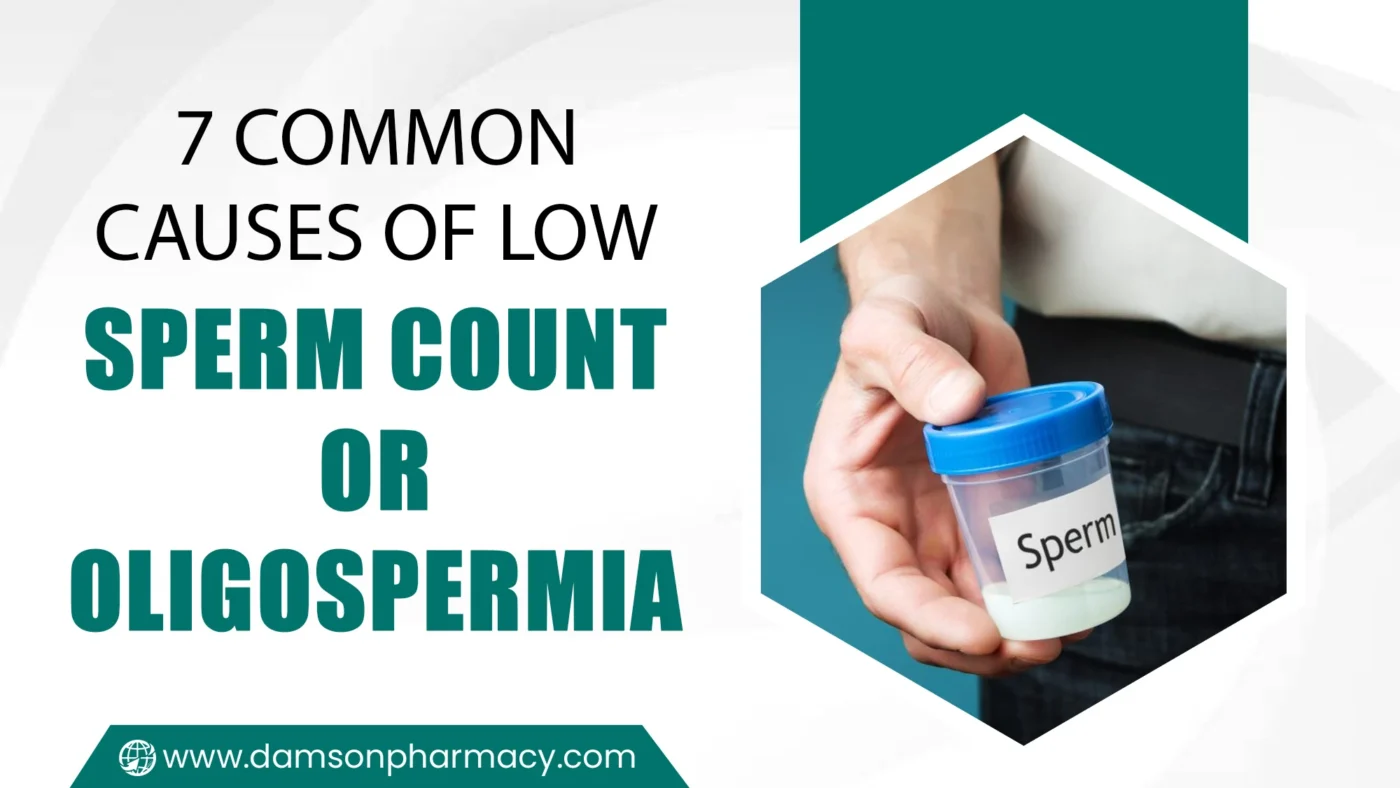7 Common Causes of Low Sperm Count or Oligospermia
Male fertility is key for pregnancy. Many couples struggle to conceive because of low sperm count, known as oligospermia. This disease refers to a sample of semen that has less sperm than usual, usually less than 15 million sperm per milliliter.
A low number of sperm can make it much harder to fertilize an egg, which lowers the chances of getting pregnant. It is one of the most common reasons men can’t have children, but it is often ignored.
Many things can cause this, such as bad habits, health problems, genetics, and the surroundings. For successful treatment and long-term prevention, it’s essential to understand these root causes.
This article covers seven common reasons for low sperm count. It also gives advice on how to diagnose, stop, and treat the issue. These steps can help improve men’s reproductive health.
Understanding Low Sperm Count
Oligospermia means low sperm count. It happens when a man’s semen has fewer sperm than normal, typically less than 15 million sperm per millilitre.
This makes it much less likely that an egg will be fertilised, which makes it hard to get pregnant. Low sperm count is a major reason men struggle to have children.
It can occur alone or with other reproductive issues. These may include sperm that don’t move well or have abnormal shapes. In some cases, it may occur along with erectile dysfunction, making it even harder to get pregnant.
Causes include hormonal imbalances, genetic disorders, lifestyle choices, and the environment. Many cases can be managed by changing lifestyle, using medical treatments, or using reproductive tools.

1. Hormonal Imbalances
Hormones play a significant role in controlling sperm output and male fertility. A complex endocrine axis is made up of the brain, the pituitary gland, and the testes.
It controls testosterone levels and makes sperm. It uses follicle-stimulating hormone (FSH) and luteinizing hormone (LH) for this.
If this system is thrown off, it can cause Low Sperm Count, which makes it harder to get pregnant naturally.
Hypogonadism, hyperprolactinemia, and thyroid issues can greatly affect hormone levels. This includes both hypothyroidism and hyperthyroidism.
Tumors or damage to the pituitary gland also play a role. Hormonal balance can also be changed by outside factors like long-term worry or obesity.
Using anabolic steroids to gain muscle or replace testosterone can stop the body from producing testosterone.
This can make it hard to get pregnant, either for a short time or permanently. Fixing these chemical issues is key. It helps restore normal sperm production and boosts reproductive health.
What You Can Do:
A blood test that checks for changes can measure hormone levels (FSH, LH, and testosterone). Hormone replacement treatment or changes to the way you live may sometimes help you get pregnant.
2. Varicocele (Enlarged Veins in the Scrotum)
As with varicose veins in the legs, a varicocele is an abnormal enlargement of the veins in the testicles.
It is known that this problem affects about 15% of men and is one of the most common reasons for Low Sperm Count.
Varicoceles can disrupt the testes’ cooling system. This raises scrotum temperature, making it harder for sperm to move and reproduce.
Staying in high heat for a long time and having poor blood flow can lead to oxidative stress. This stress can harm sperm DNA and make it tougher to conceive.
Many times, men with varicoceles don’t know they have the problem until pregnancy tests show it. Sildenafil improves blood flow.
Men who want to improve sperm function and increase their chances of pregnancy should consider surgery, like varicocelectomy.
What You Can Do:
A scrotal ultrasound and a physical exam can both prove that you have a varicocele. Surgery (varicocelectomy) or embolisation are two treatments that can be used. In many cases, both have been shown to improve sperm characteristics.
3. Lifestyle and Environmental Factors
Some daily habits and reactions to the environment can have a significant effect on the quality of sperm and a man’s ability to reproduce.
Low Sperm Count can be caused by things like smoking, drinking too much booze, using drugs for fun, being overweight, and not being active enough.
These habits could cause hormonal changes, oxidative stress, and slower sperm movement. Hot tubs, saunas, and even laptops on your lap can heat your scrotum.
This extra heat may stop sperm production. Pollutants in the environment, including radiation, heavy metals like lead and mercury, and industrial chemicals, can harm testicles.
They also damage sperm DNA. Sildigra Black Force 200mg can help with erectile dysfunction. However, changing lifestyle and environmental factors is also important. This can improve sperm health and boost reproductive success.
What You Can Do:
Change your habits to be healthier: don’t smoke, drink less alcohol, keep your weight stable, and keep your groin area from getting too hot. It is also essential to wear protective gear when working in toxic settings.
4. Infections and STDs
Infections in the male reproductive system can make it very hard for sperm to be made and moved around, which can lead to a low Sperm Count.
Epididymitis is inflammation of the epididymis. Orchitis is inflammation of the testicles. Both can damage the delicate cells that support sperm growth.
STIs, such as gonorrhea and chlamydia, can be alarming. They may harm the reproductive system by causing scarring, blocking, and inflammation over time.
Sperm can’t move normally through the ducts because of these blockages. This lowers the total sperm count.
Also, systemic illnesses, especially the mumps virus after puberty, can damage or atrophy the testicles in a way that can’t be fixed.
Quickly diagnosing and treating infections in men is vital. This helps maintain their fertility and prevents long-term reproductive health issues.
What You Can Do:
You can avoid long-term fertility issues by quickly treating infections with medicine and getting proper medical care. Having safe sex and getting checked for STIs on a regular basis can help protect you from damage that can lead to low sperm count.
5. Genetic or Chromosomal Disorders
Genetic causes of Low Sperm Count are often not found until a guy has trouble getting pregnant. . Other genetic diseases, such as Y chromosome microdeletions, directly affect the parts of the body that make sperm.
Also, genes related to cystic fibrosis can cause the vas deferens to not exist at birth, which stops sperm transport completely.
You might see physical signs of these genetic issues. They can include less body hair, small testicles, or underdeveloped reproductive organs.
Even though not all cases can be cured, getting a diagnosis early lets people make wise choices about fertility therapies.
Some men look into performance boosters like Cobra Jelly, but if they have infertility that is caused by their genes, they need to see a doctor.
What You Can Do:
Chromosome problems can be found with a karyotype test or genetic screening. Many genetic conditions can’t be fixed. However, methods like IVF with ICSI (intracytoplasmic sperm injection) can help. This gives people hope for having children.
6. Medications and Medical Treatments
Some medicines and medical procedures can greatly affect a man’s ability to have children. They might temporarily or permanently stop sperm production.
Chemotherapy and radiation therapy often treat cancer. However, they are also common reasons for reduced or stopped sperm production.
This is because they hurt cells that divide quickly, including sperm. Using antibiotics (like tetracyclines), antifungals, or medications for ulcers, depression (such as SSRIs), or high blood pressure (like beta-blockers) for a long time can change hormone levels.
They can also impact testicle function. Even over-the-counter painkillers, like ibuprofen, can change testosterone levels.
If used often and for a long time, they can upset hormone balance. Men who are trying to get pregnant should always talk to a doctor before starting or continuing to take these drugs.
What You Can Do:
Talk to your doctor if you are worried about how a medicine might affect your ability to have children. You might have other choices. You could also be advised to freeze your sperm before starting medical treatments that could impact your ability to have kids.
7. Ejaculation and Structural Disorders
Problems with ejaculation can make Low Sperm Count in the semen a lot worse. Retrograde ejaculation is one of the most common problems.
This is when sperm move backwards into the bladder during an orgasm instead of leaving through the urethra.
Because of this, the ejaculate has very little or no sperm in it, which makes it very hard to get pregnant. Sperm can’t reach the semen if there are issues in the body.
For example, blockages or barriers in the vas deferens or epididymis can hinder sperm movement.
These physical problems often arise from past treatments, like hernia repairs, pelvic injuries, infections (especially STDs), or congenital birth defects.
Physical exams and expert semen analysis are usually used to make a diagnosis. In many cases, medical or surgical intervention may improve fertility results.
What You Can Do:
A study of the sperm can help find out if the problem is with transporting the sperm instead of making them. Medications, surgery, or taking sperm straight from the testes for use in assisted reproduction may be used for treatment.
How is Low Sperm Count Diagnosed?
Low Sperm Count is usually found through a semen study, in which a sample is checked for sperm volume, concentration, motility, and shape. If there are problems, you may be told to get more tests, such as
- Hormone evaluations
- Scrotal ultrasound
- Genetic testing
- Testicular biopsy
- STI screening
These tests help determine the root cause and guide appropriate treatment plans.
Tips to Naturally Boost Sperm Count
- Medical treatments can be helpful, but there are also natural ways to keep sperm healthy:
- Consume a healthy diet full of antioxidant-rich foods like fruits, veggies, and whole grains.
- If you aren’t getting enough zinc, folic acid, CoQ10, or vitamin D, you should take pills.
- Stay busy, but don’t train too much.
- Get enough rest and deal with your worry. Stay away from environmental toxins as much as possible.
- Don’t wear tight underwear or sit for long periods.
These habits not only help make more sperm, but they also improve the health of reproduction in general.
Conclusion
Low Sperm Count can be sad news, but the first step to getting better is to learn what causes it. Many factors can affect sperm health.
These include hormonal imbalances, lifestyle choices, and medical treatments. Many causes can be fixed or managed.
You can get medical help, make lifestyle changes, or use better reproduction methods. If you think you might have Low Sperm Count, you should see a doctor right away.
Taking the initiative can help you get care and increase your chances of becoming a father. Many guys are able to get pregnant with the right help and plan, showing that fertility problems can often be solved.
Reference
Acknowledgment:
Damson Pharmacy only refers to credible, authoritative sources for our content. If you’re curious about how we ensure the integrity of our content, we encourage you to read our Content Information Policy.

